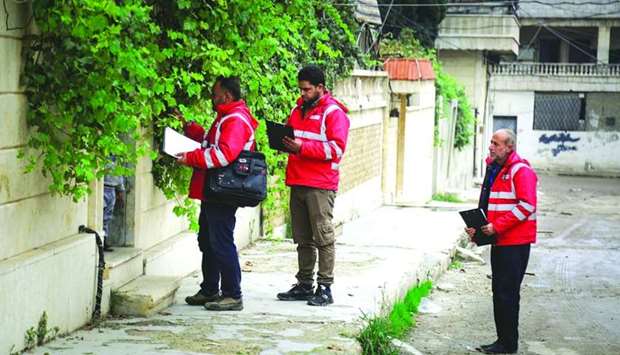Qatar Red Crescent Society (QRCS) has implemented a new edition of the neutral vaccination monitoring programme in Syria.
Its representation mission in Turkey monitored the second winter polio vaccination campaign, which targeted over 815,000 Syrian children aged between 0 to 5.
Over a whole week, 110 inspectors, supervisors, and co-ordinators of QRCS in Syria moved from house to house, accompanying the vaccination teams of the United Nations Children's Fund (Unicef) and the World Health Organisation (WHO). They monitored the process of giving oral polio vaccines and Vitamin A to the beneficiaries.
The vaccination and monitoring personnel covered many parts of Idlib and Aleppo.
The purpose is to reach out to all the children who had never been vaccinated under the previous campaigns.
With a failed health sector and a total absence of public health services due to the war, such drives are crucial to completely eradicate polio among Syrian children.
The neutral vaccination monitoring program seeks to ensure the validity of vaccine application and readiness of the assigned centers, outline the action plans, keep an eye on the vaccinators as they are doing their job, support them with advising to avoid inconveniences, conduct screening of different target areas to identify coverage rates among children, and find where coverage is inadequate, which would be the focus of coming campaigns.
In preparation for the vaccination drives, the inspectors attend intensive in-house and field training courses, to be better able to perform monitoring, planning, follow-up, and documentation.
Once ready, they are deployed together with the vaccinators to the target districts.
The process typically involves three phases.
Prior to a campaign, the supervisors visited the main centres to make sure of readiness and equipment.
Then, vaccine samples and storage conditions are checked in compliance with the WHO standards.
The inspectors accompany the vaccinators to evaluate their performance at health centers and households.
Finally, the results are reported to see what went right and what went wrong, as feedback to guide future operations.
Day-to-day and final reports were submitted to WHO.
Over a whole week, 110 inspectors, supervisors, and co-ordinators of QRCS in Syria moved from house to house, accompanying the vaccination teams of the United Nations Children's Fund (Unicef) and the World Health Organisation (WHO). They monitored the process of giving oral polio vaccines and Vitamin A to the beneficiaries.
The vaccination and monitoring personnel covered many parts of Idlib and Aleppo.
The purpose is to reach out to all the children who had never been vaccinated under the previous campaigns.
With a failed health sector and a total absence of public health services due to the war, such drives are crucial to completely eradicate polio among Syrian children.
The neutral vaccination monitoring program seeks to ensure the validity of vaccine application and readiness of the assigned centers, outline the action plans, keep an eye on the vaccinators as they are doing their job, support them with advising to avoid inconveniences, conduct screening of different target areas to identify coverage rates among children, and find where coverage is inadequate, which would be the focus of coming campaigns.
In preparation for the vaccination drives, the inspectors attend intensive in-house and field training courses, to be better able to perform monitoring, planning, follow-up, and documentation.
Once ready, they are deployed together with the vaccinators to the target districts.
The process typically involves three phases.
Prior to a campaign, the supervisors visited the main centres to make sure of readiness and equipment.
Then, vaccine samples and storage conditions are checked in compliance with the WHO standards.
The inspectors accompany the vaccinators to evaluate their performance at health centers and households.
Finally, the results are reported to see what went right and what went wrong, as feedback to guide future operations.
Day-to-day and final reports were submitted to WHO.

